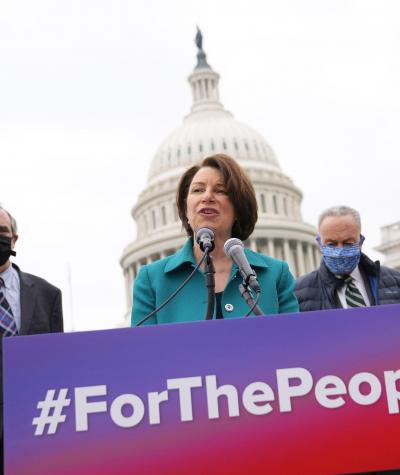The For the People Act (H.R.1/S. 1) is a once-in-a-generation transformative legislative package. If passed, it will move the country’s political system closer to the American ideal of an inclusive democracy.
The sweeping bill would fix our elections by reducing the influence of wealthy special interests in our politics and ensuring Americans have the freedom to vote. It would also address ethics abuses in government and end the practice of gerrymandering congressional districts.
What’s in the Bill?
The major reforms in the bill cover four issue areas: campaign finance, ethics, voting rights, and redistricting.
Voting Rights
Expands access to the ballot box by removing institutional barriers to voting.
- Modernizes our country’s voter registration system by making it automatic.
- Restores voting rights to people with felony convictions who have completed their sentence.
- Simplifies voting by mail.
- Reduces long lines at polling places.
Ethics
Ensures that public officials are working in the public interest.
- Fortifies ethics laws by expanding conflict of interest rules.
- Strengthens ethics enforcement by empowering the U.S. Office of Government Ethics.
Redistricting
Ends partisan gerrymandering at the federal level.
- Requires all states to use independent commissions to draw congressional district lines rather than self-interested politicians.
- Makes the rules for drawing maps uniform nationwide.
- Gives the public a chance to review maps and provide input.
Campaign Finance
Reduces corruption by ensuring real transparency about who is spending big money on elections.
- Institutes transparency of corporate spending.
- Prevents laundering of campaign funds through front groups.
- Cracks down on coordination between candidates and super PACs.
- Empowers small donors to have a say in politics.
What’s NOT in the Bill
Opponents of the For the People Act are typically people who stand to gain from the status quo and want politicians and special interests to continue to dominate politics.
Some have spread disinformation about noncitizens voting and have made other provably false claims that CLC has addressed when asked by reporters.
Overwhelming Public Support
The For the People Act’s solutions are broadly supported by the American people across the political spectrum. Polling indicates 67% of Americans – including 56% of Republican voters and 68% of Independent voters – support the For the People Act.
When you look at reforms individually, such as ending partisan gerrymandering, public support is similarly strong.
In fact, when asked to choose whether districts should be drawn by politicians or an independent redistricting commission, voters favor the latter by a nearly three-to-one margin.
Why We Need This Legislation Immediately?
The 2020 election underscored the urgent need for democracy reform.
Across the country, Americans experienced voter suppression and increased levels of dark money spent to drown out the voices of everyday Americans.
Recent years have also shown rampant ethical abuses by government officials and an overreliance on special interests.
The For the People Act addresses these serious problems and will make our government more accessible and responsive to all citizens.
The Jan. 6, 2021 attack by violent insurrectionists was the most recent and serious challenge to our democracy.
While the attempt to overturn the election ultimately failed, the fact it was encouraged by the president reflects a deeper decay in public confidence in our elections and government.
This deadly incident is a symptom of a deeper problem with our democracy and only further underscores the urgency with which we need to think big about how we change our system into one that works for all of us.
There is also considerable urgency around passing these reforms now because of record-setting secret spending, also known as dark money, and the fact that more than 253 bills restricting voting access have been moving in 43 states.
Will Congress Pass The Bill?
CLC developed a memo showing how the democracy reforms in the For the People Act are drawn from bills that have long had bipartisan political sponsorship at both the federal and state levels, and the bill’s provisions would address problematic practices employed by both Democrats and Republicans.
There are plenty of examples of times when Americans have come together to update our democracy when it was needed.
- In 1965, Congress passed the Voting Rights Act with bipartisan support, and it was renewed with broad bipartisan support for decades to come.
- In the 1970s, amid the corruption and pay-to-play revealed in the Watergate era, Republicans and Democrats worked together to reform campaign finance laws in the Federal Election Campaign Act. When wealthy special interests found loopholes in those laws throughout the 1980s and 1990s, Congress responded in 2002 with the Bipartisan Campaign Reform Act.
- After the 2000 election revealed serious flaws in voting systems and processes, Republicans and Democrats in Congress worked together to pass the Help America Vote Act.
- Following the Jack Abramoff corruption scandal exposed flaws in federal lobbying laws, Congress in 2007 passed the bipartisan Honest Leadership and Open Government Act.
Many elected officials have pledged to prioritize fixing our elections by making sure Americans have the freedom to vote. Americans deserve to have a government that is accessible, transparent and responsive.
